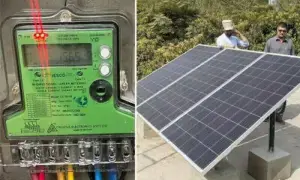TSMC expects drop in Q2 sales as it grapples to clear inventory
3 min readTAIPEI: Taiwanese chipmaker TSMC (2330.TW) forecast on Thursday a fall of as much as 16% in current-quarter sales amid a weakening global economy and as the Apple Inc (AAPL.O) supplier struggles to clear inventory.
As the biggest maker of chips that power products as varied as phones, cars and advanced computers, Taiwan Semiconductor Manufacturing Co Ltd (TSMC) must navigate an uncertain industry outlook and a U.S.-China chip spat that could make it vulnerable.
TSMC forecast revenue of $15.2 billion to $16 billion in the quarter ending June 30, down from $18.16 billion a year prior.
Earlier, the company posted a 2% rise in first-quarter net profit, beating market expectations, but that was still the smallest quarterly growth in almost four years as global economic woes dented demand for chips.
Speaking on an earnings call, Chief Executive C.C. Wei said first-quarter results were hurt by “softening end-market demand”, while inventory levels were “much higher” than expected and that could extend into the third quarter.
He said he expects business in the second half to be better than the first six months and that the company was investing for long-term demand despite current softness in the market.
January-March net profit rose to T$206.9 billion ($6.76 billion) from T$202.7 billion a year earlier, compared with the T$192.8 billion average of 21 analyst estimates compiled by Refinitiv.
TSMC, Asia’s most valuable listed company, said first-quarter revenue dropped 4.8% year-on-year, in line with the company’s previous forecast.
High-performance computing chips and smartphone chips represented 44% and 34% of revenue respectively. Net revenue from China grew to 15% from 12%, while net revenue from North America fell to 63% from 69%.
Analysts said TSMC sales will be under pressure in the second quarter, which is traditionally a slow season for electronics manufacturers and as major clients cut back on orders.
The chipmaker forecast 2023 capital expenditure of $32-36 billion, unchanged from a previous estimate. That compared with $36.3 billion in 2022.
First-half revenue is likely to fall around 10% in U.S. dollar terms year-on-year, TSMC said, while it sees 2023 revenue falling by a low-to-single mid-digit percent.
TSMC’s dominance in making some of the most advanced chips for high-end customers such as Apple has shielded it from a broader industry downturn. But the chipmaker is likely to fall victim to the deepening slowdown.
It has repeatedly said business would continue to benefit from a “mega-trend” of demand for high-performance computing chips for fifth-generation communications (5G) networks and data centres, as well as increased use of chips in gadgets and vehicles.
TSMC said it plans to increase production outside Taiwan, as global attention focuses on its investment plans and various governments dangle incentives to boost chip manufacturing in their countries.
CEO Wei said TSMC was evaluating the possibility of building a speciality fabrication plant in Europe for auto chips.
TSMC late last year began construction of a second chip factory in Arizona which will start production in 2026, using advanced 3 nm technology, supporting Washington’s plans for more chip-making at home. Its total investment in the U.S. project amounts to $40 billion.
TSMC’s share price fell 27.1% in 2022, but is up around 14% so far this year giving the chipmaker a market value of $433.9 billion. The stock rose 0.6% on Thursday versus a 0.4% fall in the benchmark index.
For the latest news, follow us on Twitter @Aaj_Urdu. We are also on Facebook, Instagram and YouTube.



























Comments are closed on this story.